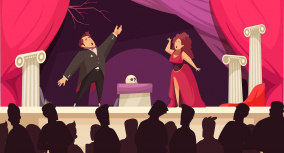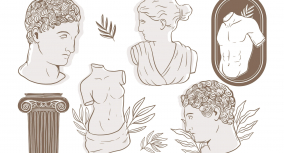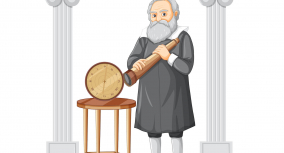In Homer’s The Odyssey, the characters include humans as well as supernatural beings, such as gods, monsters, and nymphs. The main character in The Odyssey is Odysseus, a cunning hero who spends a decade traveling home from the Trojan War. Numerous other figures either aid or obstruct him on his journey. Meanwhile, Odysseus’ family back in his home island of Ithaca is struggling against unruly suitors..
The Odyssey‘s monsters are just as iconic as the epic’s protagonist. Originally, they were supposed to present a barbaric opposite to civilized humans, but from a modern standpoint, they’re more complex than that. For example, Kim Emmerson Pratt argues in Limina Journal that Cyclops Polyphemos has a lot in common with Odysseus, and that the line between humans and monsters is more blurred than it seems.
In this article, Custom-Writing.org experts will take a closer look at the human characters, gods, and monsters in The Odyssey. You will also find here Odysseus’ family tree and plenty of relevant quotes.
Odysseus’ Family Tree
Check out the family tree of Odysseus below to learn more about the characters’ relationships:
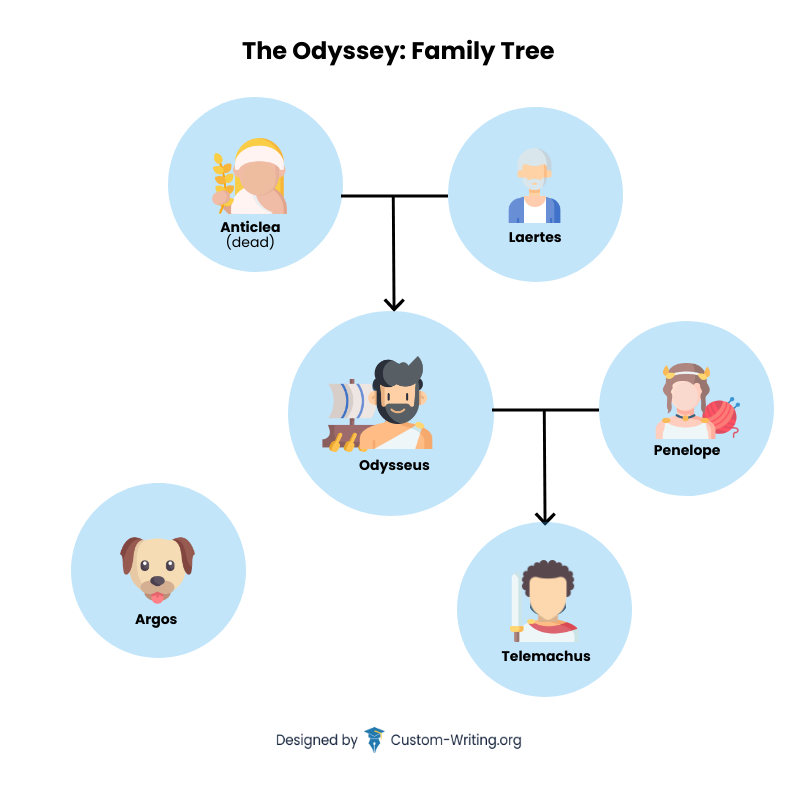
Odysseus
Odysseus is the central figure among all The Odyssey characters. Despite his importance, the readers first meet him only in book 5. It’s obvious that Odysseus is a wise and cunning warrior and the King of Ithaca. He has a faithful wife, Penelope, and a caring son, Telemachus. He is a favorite of the goddess Athena and an enemy of Poseidon.
Being a loving husband and father, Odysseus’s desire to return home after the Trojan War is what drives the narrative. After ten years of a grueling war, he starts his journey, which also takes ten years. Odysseus faces an impressive number of difficulties on his way. However, he doesn’t give up. A strong feeling of love for his family eventually leads him home.
The most crucial Odysseus’ character traits are loyalty, savvy, and bravery. Applying these virtues in different situations, he manages to overcome all the obstacles on his way.
Odysseus’s Quotes
…the man of twists and turns.
The Odyssey, Narrator, Book I
Great Odysseus
The Odyssey, Zeus, Book I
who excels all men in wisdom, excels in offerings too
he gives the immortal gods who rule the vaulting skies?
A heavy sea covered him over, then and there
The Odyssey, Narrator, Book V
unlucky Odysseus would have met his death—
against the will of Fate—
but the bright-eyed Athena inspired him yet again.
“Your majesty,” diplomatic Odysseus answered,
The Odyssey, Odysseus, Book VII
“don’t find fault with a flawless daughter now,
not for my sake, please.
She urged me to follow with her maids.
I chose not to, fearing embarrassment in fact—
what if you took offense, seeing us both together?
Suspicious we are, we men who walk the earth.”
no one of the Achaians labored
The Odyssey, Menelaos, Book IV
as much as Odysseus labored and achieved
So the famous singer sang his tale,
The Odyssey, Narrator, Book VIII
but Odysseus melted,
and from under his eyes the tears ran down,
drenching his cheeks.
Penelope
Being Odysseus’ wife and Telemachus’ mother, Penelope plays one of the leading roles in the epic. She appears in the very beginning of the story and remains one of the central figures until the end.
From the first sight, Penelope seems to be unambitious. She does nothing but waiting for Odysseus and crying days and nights. However, she is more powerful and intelligent than she seems.
A bright example is her trick with the bed to check Odysseus’ identity. Another case when Penelope demonstrates her savvy is the shroud weaving trick to delay the suitors. She pretends to weave a burial shroud for Laertes and assures the suitors that she’ll choose one of them after finishing this task, all the while she unravels the work she has done every day.
Penelope in The Odyssey is a symbol of loyalty. Despite an impressive number of suitors, she prefers to stay faithful to Odysseus. Due to the rules of hospitality, she cannot send away her annoying suitors, but her cunning helps her keep them at a distance. There’s no doubt Penelope and Odysseus’ strong marriage is largely the result of the wife’s dedication to her husband.
Penelope’s Quotes
Not one could touch Penelope for intrigue,
The Odyssey, Antinous, Book II
but in this case she intrigued beyond all limits.
So, we will devour your worldly goods and wealth
as long as she holds out, holds to that course
the gods have charted deep inside her heart.
But there in her upper rooms she lay, Penelope
The Odyssey, Narrator, Book IV
lost in thought, fasting, shunning food and drink,
brooding now … would her fine son escape his death
or go down at her overweening suitors’ hands?
Her mind in torment, wheeling
like some lion at bay, dreading gangs of hunters
closing their cunning ring around him for the finish.
But now the goddess Athena with her glinting eyes
The Odyssey, Narrator, Book XVIII
inspired Penelope, Icarius’ daughter, wary, poised,
to display herself to her suitors, fan their hearts,
inflame them more, and make her even more esteemed
by her husband and her son than she had been before.
What good sense resided in your Penelope –
The Odyssey, Agamemnon’s ghost, Book XXIV
how well Icarius’s daughter remembered you,
Odysseus, the man she married once!
The fame of her great virtue will never die.
The immortal gods will lift a song for all mankind,
a glorious song in praise of self-possessed Penelope.
Penelope started down from her lofty room, her heart
The Odyssey, Narrator, Book XXIII
in turmoil, torn … should she keep her distance,
probe her husband? Or rush up to the man at once
and kiss his head and cling to both his hands?
[…]
A long while she sat in silence … numbing wonder
filled her heart as her eyes explored his face.
Telemachus
Telemachus is Odysseus’ faithful and honorable son. He appears in the epic from the first pages and plays a crucial role in his family’s reunion. Additionally, Telemachus goes through the transformation from an immature boy to a confident man throughout the story. The goddess Athena helps him to do that.
The prince’s most prominent characteristic is his loyalty to his father. He proves it when he refuses to take the throne and goes on a journey to find Odysseus. Telemachus expresses his strong desire to get rid of his mother’s annoying suitors. The prince is concerned about the disorder they cause in their house. Nevertheless, he doesn’t dare to disrupt hospitality and boot them out. This makes Telemachus in The Odyssey an example of an ancient Greek tradition follower.
Telemachus’s Quotes
If only the gods would give me such strength
The Odyssey, Telemachus, Book III
as he has to take revenge on the suitors
for their overbearing oppression.
First by far to see her was Prince Telemachus,
The Odyssey, Narrator, Book I
sitting among the suitors, heart obsessed with grief.
He could almost see his magnificent father, here …
in the mind’s eye—if only he might drop from the clouds
and drive these suitors all in a rout throughout the halls
and regain his pride of place and rule his own domains!
“Telemachus,”
The Odyssey, Athena, Book III
the bright-eyed goddess Athena reassured him,
“some of the words you’ll find within yourself,
the rest some power will inspire you to say.
You least of all—I know—
were born and reared without the gods’ good will.”
Odysseus sat down again, and Telemachus threw his arms
The Odyssey, Narrator, Book XVI
around his great father, sobbing uncontrollably
as the deep desire for tears welled up in both.
They cried out, shrilling cries, pulsing sharper
than birds of prey—eagles, vultures with hooked claws—
when farmers plunder their nest of young too young to fly.
Athena
A powerful character who assists Odysseus and Telemachus throughout the entire epic is Athena. Greek mythology describes her as the goddess of wisdom and justice. Athena appears in book 1 in the appearance and voice of Mentor. She secretly comes to Telemachus to help him find his father.
Athena admires Odysseus’ feats and achievements, which is why she always helps him. However, her partiality to Odysseus puts her in conflict with her father’s brother Poseidon. The goddess is afraid of Odysseus’ enemy and interacts with him exceptionally carefully.
Brave, wise, powerful, and caring – that’s how Homer portrays Athena in The Odyssey. She acts honorably and plays an essential role in Odysseus’s return home.
Athena’s Quotes
Athena began, recalling Odysseus to their thoughts,
The Odyssey, Athena, Book V
the goddess deeply moved by the man’s long ordeal,
held captive still in the nymph Calypso’s house:
“Father Zeus—you other happy gods who never die—
never let any sceptered king be kind and gentle now,
not with all his heart, or set his mind on justice—
no, let him be cruel and always practice outrage.
Think: not one of the people whom he ruled
remembers Odysseus now, that godlike man,
and kindly as a father to his children.”
And Pallas Athena sped away in the lead
The Odyssey, Narrator, Book VII
as he followed in her footsteps, man and goddess.
But the famed Phaeacian sailors never saw him,
right in their midst, striding down their streets.
Athena the one with lovely braids would not permit it,
the awesome goddess poured an enchanted mist around him,
harboring kindness for Odysseus in her heart.
We’re both old hands
The Odyssey, Athena, Book XIII
at the arts of intrigue. Here among mortal men
you’re far the best at tactics, spinning yarns,
and I am famous among the gods for wisdom,
cunning wiles, too.
Ah, but you never recognized me, did you?
Pallas Athena, daughter of Zeus—who always
stands beside you, shields you in every exploit.
I could not bring myself to fight my father’s brother,
The Odyssey, Athena, Book XIII
Poseidon, quaking with anger at you, still enraged.
Poseidon
Poseidon is a powerful and mighty god of the sea. If Odysseus is the protagonist in the epic, then Poseidon the role of the antagonist. The readers meet him for the first time in book 5 when he raises a storm to kill the hero.
You might be wondering: why Odysseus and Poseidon are enemies? Well, the hero has once blinded Poseidon’s son – the giant Polyphemus. Being an overprotective father, the god seeks revenge and becomes a hostile grudge-holder. He creates a lot of obstacles for Odysseus on his way home: raises a storm, smashes ships, and so on. His actions are purely evil and immoral.
Poseidon’s Quotes
But then, when the wheeling seasons brought the year around,
The Odyssey, Narrator, Book I
that year spun out by the gods when he should reach his home,
Ithaca—though not even there would he be free of trials,
even among his loved ones—then every god took pity,
all except Poseidon. He raged on, seething against
the great Odysseus till he reached his native land.
Great Odysseus
The Odyssey, Zeus, Book I
who excels all men in wisdom, excels in offerings too
he gives the immortal gods who rule the vaulting skies?
No, it’s the Earth-Shaker, Poseidon, unappeased,
forever fuming against him for the Cyclops
whose giant eye he blinded: godlike Polyphemus,
towering over all the Cyclops’ clans in power.
But just as great Odysseus thrashed things out,
The Odyssey, Narrator, Book V
Poseidon god of the earthquake launched a colossal wave,
terrible, murderous, arching over him, pounding down on him,
hard as a windstorm blasting piles of dry parched chaff,
scattering flying husks—so the long planks of his boat
were scattered far and wide.
Poseidon god of the earthquake smashed my ship,
The Odyssey, Odysseus, Book IX
he drove it against the rocks at your island’s far cape,
dashed it against a cliff as the winds rode us in.
I and the men you see escaped a sudden death.
He’d say Poseidon was vexed with us because
The Odyssey, Alcinous, Book XIII
we escorted all mankind and never came to grief.
He said that one day, as a well-built ship of ours
sailed home on the misty sea from such a convoy,
the god would crush it, yes,
and pile a huge mountain round about our port.
So the old king foretold. Now, look, it all comes true!
Circe
The readers meet Circe in The Odyssey book 10, where she is described as a hospitable and lovely goddess. Circe astonishes Odysseus with her divine beauty and tenderness, so he stays at her palace for a year.
Circe has the supernatural power of turning the men into pigs. That’s what she did with Odysseus’ friends in order to demonstrate her power. But since the men didn’t lose their consciousness, they managed to reminded the hero about their journey home.
So, after a year of a pleasant life, Odysseus and Circe separate. The goddess even helps Odysseus by pointing out his further route. All these actions prove that she was empathetic towards him.
Circe’s Quotes
We reached the Aeaean island next, the home of Circe
The Odyssey, Odysseus, Book X
the nymph with lovely braids, an awesome power too
who can speak with human voice,
the true sister of murderous-minded Aeetes.
So did Circe, holding me just as warmly in her halls,
The Odyssey, Odysseus, Book IX
the bewitching queen of Aeaea keen to have me too.
But they never won the heart inside me, never.
So nothing is as sweet as a man’s own country,
his own parents, even though he’s settled down
in some luxurious house, off in a foreign land
and far from those who bore him.
Circe had bathed my other comrades in her palace,
The Odyssey, Odysseus, Book X
caring and kindly, rubbed them sleek with oil
and decked them out in fleecy cloaks and shirts.
We found them all together, feasting in her halls.
Now down we came to the ship at the water’s edge,
The Odyssey, Odysseus, Book XI
we hauled and launched her into the sunlit breakers first,
[…]
then we ourselves embarked, streaming tears,
our hearts weighed down with anguish …
But Circe the awesome nymph with lovely braids
who speaks with human voice, sent us a hardy shipmate.
Circe the lustrous one came toward me, pleading,
The Odyssey, Circe, Book X
‘Royal son of Laertes, Odysseus, man of action,
no more tears now, calm these tides of sorrow.
Well I know what pains you bore on the swarming sea,
what punishment you endured from hostile men on land.
But come now, eat your food and drink your wine
till the same courage fills your chests, now as then,
when you first set sail from native land, from rocky Ithaca!’
Calypso
A beautiful and hospitable goddess Calypso appears in book 5. She feels a strong attraction to Odysseus and keeps him on her island for seven years.
Calypso in The Odyssey appears as a fighter for equality. When Hermes comes to take Odysseus away from her, she gives a furious monologue about male gods’ double standards. Nevertheless, Odysseus and Calypso’s life on the island comes to an end. Despite her attraction to Odysseys, Calypso lets him go because she cannot resist Zeus’ command.
Calypso’s Quotes
I drifted along nine days. On the tenth, at night,
The Odyssey, Odysseus, Book XII
the gods cast me up on Ogygia, Calypso’s island,
home of the dangerous nymph with glossy braids
who speaks with human voice, and she took me in,
she loved me …
But lustrous Calypso shuddered at those words
The Odyssey, Calypso, Book V
and burst into a flight of indignation. “Hard-hearted
you are, you gods! You unrivaled lords of jealousy—
scandalized when goddesses sleep with mortals,
openly, even when one has made the man her husband.”
So now at last, you gods, you train your spite on me
The Odyssey, Calypso, Book V
for keeping a mortal man beside me. The man I saved,
riding astride his keel-board, all alone, when Zeus
with one hurl of a white-hot bolt had crushed
his racing warship down the wine-dark sea.
[…]
And I welcomed him warmly, cherished him, even vowed
to make the man immortal, ageless, all his days …
I’ll send him off, but not with any escort.
The Odyssey, Calypso, Book V
I have no ships in reach, no crew to ply the oars
and send him scudding over the sea’s broad back.
But I will gladly advise him—I’ll hide nothing—
so he can reach his native country all unharmed.
Scylla and Charybdis
Scylla and Charybdis are disgusting and horrifying sea-monsters from The Odyssey appearing in book 12. They swallow the seawater with everything that happens to be in there and then throw it up.
Despite the extreme fear the monsters cause, Odysseus overcomes them. Instead of fighting them, he passes them by very quickly. This way, he eliminates the danger of Scylla and Charybdis in The Odyssey.
Scylla and Charybdis’s Quotes
Scylla lurks inside it—the yelping horror,
The Odyssey, Circe, Book XII
yelping, no louder than any suckling pup,
but she’s a grisly monster, I assure you.
[…]
She has twelve legs, all writhing, dangling down
and six long swaying necks, a hideous head on each,
each head barbed with a triple row of fangs, thickset,
packed tight—armed to the hilt with black death!
Now wailing in fear, we rowed on up those straits,
The Odyssey, Odysseus, Book XII
Scylla to starboard, dreaded Charybdis off to port,
her horrible whirlpool gulping the sea-surge down, down
but when she spewed it up—like a cauldron over a raging fire—
all her churning depths would seethe and heave—exploding spray
showering down to splatter” the peaks of both crags at once!
Scylla’s no mortal, she’s an immortal devastation,
The Odyssey, Circe, Book XII
terrible, savage, wild, no fighting her, no defense—
just flee the creature, that’s the only way.
Waste any time, arming for battle beside her rock,
I fear she’ll lunge out again with all of her six heads
and seize as many men.
All night long I was rushed back, and then at break of day
The Odyssey, Odysseus, Book XII
I reached the crag of Scylla and dire Charybdis’ vortex
right when the dreadful whirlpool gulped the salt sea down.
But heaving myself aloft to clutch at the fig-tree’s height,
like a bat I clung to its trunk for dear life—not a chance
for a good firm foothold there, no clambering up it either,
the roots too far to reach, the boughs too high overhead,
huge swaying branches that overshadowed Charybdis.
Polyphemus
Polyphemus is another The Odyssey monster – an ignorant, cannibalistic, one-eyed son of Poseidon. He is the Cyclops and the central figure of book 9.
Polyphemus in The Odyssey is the symbol of savage brute force. Being incredibly hostile, he causes a lot of danger for Odysseus’ team and provokes a battle. During that dramatic fight, Odysseus pokes out Polyphemus’s only eye. This becomes the reason for Poseidon’s outrage.
Polyphemus’s Quotes
From there we sailed on, our spirits now at a low ebb,
The Odyssey, Odysseus, Book IX
and reached the land of the high and mighty Cyclops,
lawless brutes, who trust so to the everlasting gods
they never plant with their own hands or plow the soil.
[…]
They have no meeting place for council, no laws either,
no, up on the mountain peaks they live in arching caverns—
each a law to himself, ruling his wives and children,
not a care in the world for any neighbor.
We Cyclops never blink at Zeus and Zeus’s shield
The Odyssey, Polyphemus, Book IX
of storm and thunder, or any other blessed god—
we’ve got more force by far.
I’d never spare you in fear of Zeus’s hatred,
you or your comrades here, unless I had the urge.
Once the Cyclops had stuffed his enormous gut
The Odyssey, Odysseus, Book IX
with human flesh, washing it down with raw milk,
he slept in his cave, stretched out along his flocks.
So we seized our stake with its fiery tip
The Odyssey, Odysseus, Book IX
and bored it round and round in the giant’s eye
till blood came boiling up around that smoking shaft
and the hot blast singed his brow and eyelids round the core
and the broiling eyeball burst—
its crackling roots blazed
and hissed—
as a blacksmith plunges a glowing ax or adze
in an ice-cold bath and the metal screeches steam
and its temper hardens—that’s the iron’s strength—
so the eye of the Cyclops sizzled round that stake!
The Sirens
In book 12, Odysseus meets beautiful but dangerous creatures – the Sirens. In The Odyssey, they sing their limpid song and enchant all the men approaching them. The singing makes sailors forget about everything, and they crash into the rocks, destroying their ships.
Despite the danger, during the encounter of Odysseus and the Sirens, Odysseus wins. He remembers Circe’s advice to plug his and his crew’s ears with wax to avoid hearing the creatures sing. Odysseus follows the instructions and successfully overcomes the Sirens.
The Sirens’s Quotes
First you will raise the island of the Sirens,
The Odyssey, Circe, Book XII
those creatures who spellbind any man alive,
whoever comes their way. Whoever draws too close,
off guard, and catches the Sirens’ voices in the air—
no sailing home for him, no wife rising to meet him,
no happy children beaming up at their father’s face.
Soften some beeswax
The Odyssey, Circe, Book XII
and stop your shipmates’ ears so none can hear,
none of the crew, but if you are bent on hearing,
have them tie you hand and foot in the swift ship,
erect at the mast-block, lashed by ropes to the mast
so you can hear the Sirens’ song to your heart’s content.
But if you plead, commanding your men to set you free,
then they must lash you faster, rope on rope.
So they [the Sirens] sent their ravishing voices out across the air
The Odyssey, Odysseus, Book XII
and the heart inside me throbbed to listen longer.
I signaled the crew with frowns to set me free—
they flung themselves at the oars and rowed on harder,
Perimedes and Eurilochus springing up at once
to bind me faster with rope on chafing rope.

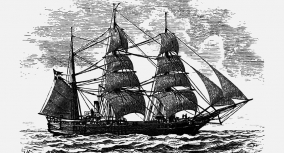
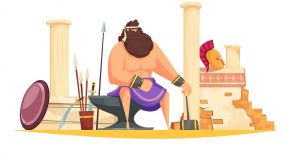
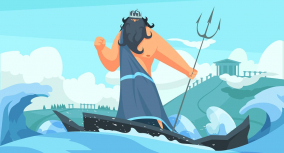
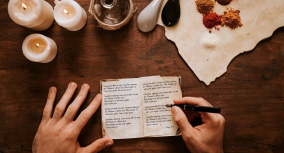


![Hamlet Themes: Death, Revenge, & Others [With Quotes]](https://custom-writing.org/blog/wp-content/uploads/2021/02/Themes-284x153.jpg)

